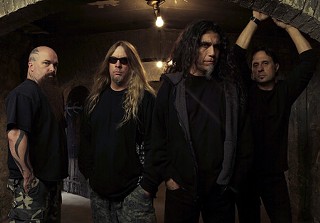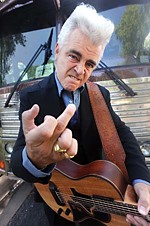Melodymaker
Texan/Slayer Tom Araya
By Raoul Hernandez, Fri., Sept. 24, 2010

"You're reaching me in Palestine," replied Tom Araya over the phone in late July, pronouncing it "Pales-teen" in correcting me. "I thought it was pronounced 'Pales-tyne' too, but they've corrected me many times. I've lived here 15 years."
He laughs – as Araya will do easily and often over the next hour even though tomorrow he departs his 63-acre ranch in East Texas for another Slayer tour. Modern metal's best mane for 30 years running, death mask for lightning storm guitarists Kerry King and Jeff Hanneman, and one-quarter of Slayer's original four including drum maquiladora Dave Lombardo, the Chilean singer/bassist, whose family moved to Los Angeles before he hit preschool, certainly sounds Texan, interrupting our conversation when his family outing pulls into a parking lot.
"We're in Palestine right now, and we're going into ... Supercenter Walmart!" Araya exclaims. "Dude! I'm missing out! They're going in the store without me!"
With Slayer not raining down on Austin since a two-night siege of La Zona Rosa in 2002, live music capitalists are also missing out when the metal institution performs its 1990 hollow point kill Seasons in the Abyss this weekend – Friday (Dallas), Saturday (San Antonio), Sunday (Houston) – everywhere but here. For this, even Slayer's late-career peak World Painted Blood last year proves no salve. Perhaps there really is no God.
Austin Chronicle: Now that you've lived in Texas 15 years, do you feel Texan?
Tom Araya: Yeah. Yeah, I sure do. I sure do. And I understand why there's a whole Texas mentality. It's very different from an American mentality.
AC: How would you describe it?
TA: Very proud. A very proud mentality. It all stems from the fact that Texas was a republic. Well, it's still its own republic [laughs].
AC: By the time you moved to Palestine, Slayer had been playing Texas for years.
TA: Oh yeah. One of our very first tours, when we were on Metal Blade with Haunting the Chapel, we did here in Texas. That was at the very beginning of Slayer's career.
AC: San Antonio has a reputation as one of the metal capitals of the world. Slayer's played those places. Is the Alamo City's reputation well earned?
TA: Yeah, very. San Antonio I remember very well because there was another band from that time that was from San Antonio. They had the same name: Slayer. We did a show with them and after the show we carried the name [laughs]. That was done in San Antonio – the metal capital.
AC: You grew up speaking Spanish.
TA: Yeah, English and Spanish, but mainly Spanish because of my parents.
AC: How's your Spanish these days?
TA: Not great. Not great since it was only limited to my parents. My other siblings, we all spoke English to each other. My father passed away quite a few years back, but when I'm around my mom I speak Spanish, and it tends to get better the more I speak to her.
AC: You still have family in Chile.
TA: Yeah. Actually, all the family I have. There's a few relatives here in the States, but there aren't that many. You're talking maybe one or two. But yeah, the majority of my family is still in Chile.
AC: Does playing Chile feel like a homecoming to you?
TA: Oh yeah, yeah. We played Chile starting in '93, and we've gone back maybe four times, or South America I should say. It always feels like a homecoming to me, because that's how I'm treated, especially in Chile. Everyone there treats me as a native son that's done very well for himself. They make the trip special. All the Chilean fans do.
AC: Did your folks get to experience one of those huge stadium shows?
TA: Yeah, in Chile.
AC: Did they "get it"?
TA: That's the one thing that's very special about this band – our families. Not only my family, but Jeff, Kerry, and Dave's family. When the band first came together, their parents would come to our shows and watch us perform at the Hollywood clubs that allowed us to play. They had an idea what the band was about and the style of music we were playing. As far as a big audience, my parents got an opportunity to witness that in 1990, when we did a show at the L.A. Sports Arena, which was sold out, 13,000 people. It was us and Testament. They were able to witness the extent of the audience that we have. And then of course when we played Chile, I flew them there so they could be a part of our first show ever in Chile. My parents were very supportive of the band. In recent years, it's basically been my family coming to shows, with some of Kerry's older siblings also coming out.
AC: Kerry has said that the new Slayer album's about spreading a little hate worldwide.
TA: Kerry's philosophy in life .... He's been disenchanted with religion, I guess [laughs]. He's made a living writing songs about how much he hates it [laughs again]. That's the best way I can approach that, because I'm somewhat of a religious person. I have a very core belief in God, and nothing can change that; nothing will change that. Even what I do in this band for the past 30 years hasn't changed that. Kerry feels he's on a mission [laughs]. And I don't judge him for it. He's a great songwriter.
AC: For a band with such prolific songwriters in its two guitarists, both of the band's Grammys have been for compositions to which you've contributed – "Final Six" and "Eyes of the Insane."
TA: Yeah. "Final Six" was a song Jeff put together, and I helped him in the studio as far as lyrics and how it was sung. That's basically what I do. If they let me do my part in the studio that's what I bring to the table. A lot of the stuff that Kerry writes, in the past, if you took liberties with things, it was not appreciated. That's kind of why Jeff and I work together, because Jeff appreciates what I do and help him out with. And yeah, a lot of the songs we end up doing live are the songs I helped write. Which is kind of awkward [laughs]. I don't write anything musically. I'm basically a lyricist and a melodymaker.
AC: You played a large part in the composition of "Eyes of the Insane," which landed you your first Grammy. Were Kerry and Jeff like, "WTF?"
TA: Especially with that song, it had a lot to do with the time. It being nominated for a Grammy had a lot to do with the subject matter. Everybody is big on the war, and that song's about what these soldiers go through psychologically when they get home. There's always a lot of background stuff when a band starts writing material. I wasn't really allowed to do much in recent years. When Christ Illusion came together, I did what I would normally contribute. There was a time when none of my stuff was being used at all, as far as creativeness and lyrics for music and song. When I won the Grammy, that was the first song that I had written on my own. It was kind of a vindication for me. After that, on this last record, I contributed quite a bit [laughs].
AC: Where do your two Grammys live?
TA: They live right up on the mantle above the fireplace.
AC: Pretty sweet, eh?
TA: Very nice to look at.
AC: You said it was the right time for "Eyes of the Insane," and it's the same for World Painted Blood. The world's such a volatile mess, and the new album bottles that perfectly.
TA: I feel the same way. When the record was coming together, it felt that way to me. I could tell a lot of the subject matter we were writing about was so right on. I think that a lot of our albums are like that. They capture the time and period. That's kind of a unique thing with this band. When you look back at all the albums and when they were released and the material on the albums, and then you compare it to the time frame, it's pretty freaky [chuckles].
AC: It's sad, in a way, that Slayer keeps making extreme albums and they keep reflecting the times. Times are always extreme, but when you're living in them, it's even worse.
TA: I have to agree with you there – that we live in extreme times now. Even in an album nobody can see it. They don't put two and two together. It's kinda like, "Oh, it's a cool record," and that's the extent of it. They don't really pay attention to the times and what the songs are actually saying, and then compare it to what life is like now.
AC: Metal has become so amelodic, but if you go back to the bands that Slayer and Metallica were listening to originally – Thin Lizzy, Judas Priest, UFO – it's all essentially pop songs, hooks, riffs. World Painted Blood brims with lyrical hooks, like in "Snuff," with its refrain of "torture, misery, endless suffering."
TA: If you notice on South of Heaven and Seasons [in the Abyss], the songs were pretty traditional. They had verses, melodies, and little lead sections. On this new album, even with Christ Illusion, I was able to do what I do, and it's pretty noticeable when you compare it to the albums in between, from Divine Intervention on to God Hates Us All. You can tell what my influence was on a lot of songs. It's the melodies that I'd come up with. Even though there's a lot of barking and very monotone type of stuff, I still try to put the melody into it. I try to find the melody in it, period. I try to get a melody out of what's given to me.
A lot of times when Jeff and Kerry come up with ideas, they don't really have melodies. They have a cadence. They know how they want the song sung and have an idea how it's sung, but I'm the one that when I get it, I sit there and start thinking, "Okay, this is the cadence: 'La, la, la, la – la, la, la, la, la.' And I have to take that "la, la, la, la" and put waveform into it – make it a melody, not so much barking. A good example would be God Hates Us All. That album was a miserable album for me, because if you listen to it, you know that I didn't have any part in the melodies of any of the songs. If I would have, the album would be a little more tolerable [laughs]. It's pretty much a balls-out screaming/yelling type of record. It's a little brutal to the ear.
AC: The black metal documentary Until the Light Takes Us uses thrash metal of the 1980s as a jumping-off point for the whole European metal scene that followed. Do you see it that way – that it evolved out of what Slayer was doing?
TA: You know, yeah ... I guess. Yeah. We came up with this thrash metal, and then other bands come out and think, "We can play faster." That was the theory behind this new metal music, that they could be faster, that they could have more growling vocals. It evolved into: "Okay, let's see who can play faster. Who can sing the deepest and more growliest and not be understood at all." [laughs] Know what I mean? That was just something that evolved on its own. When we did Reign in Blood, we did it knowing that we weren't going to follow it with another fast record. We knew better than to just try and repeat that, because that's not what we're about. We want to be the fastest and the heaviest, but it wasn't about being faster than everyone else or seeing who could play the fastest. You got to do it with style and taste [chuckles]. That's what we stuck to. We stuck to style and taste.
AC: Is it weird that now Slayer gets good reviews, because there was a time when no one wrote nice things about the band.
TA: Yeah. That was when we were first starting off as a band and we were doing Show No Mercy songs – before we even recorded Show No Mercy. Then when the album came out, we got a really bad review on it. I read the review, and I wasn't too thrilled about it. I didn't like it. So, from that moment on, you start taking that stuff – criticism – with a grain of salt. From that day on, after reading that first review, I thought: "Fuck those guys. They don't understand what we're doing." Then we just kept on doing what we do. We didn't look for anything. Things just happened to find us. Then we were fortunate enough to even notice the opportunities that were in front of us and took advantage of those opportunities. Thirty years later we've got 10 albums. We've been touring the world since '85. We just did it, and let lady fortune guide us whenever she showed up.
AC: Still, World Painted Blood got almost universally positive reviews. That's gotta be strange on some level.
TA: Mmm. You know, like I said, I don't really pay attention to reviews anymore – since that very first review. It is awkward that people like us now when before they didn't, and the only thing different is the fact that we're 30 years into this, and 30 years into this everybody knows the name Slayer. They associate us with metal. If the music business was a popularity contest, we'd be rich. It's not. It's about the music you create and the audience you can get to buy your records [laughs].
AC: It's surprising more Slayer albums haven't gone platinum. One would assume those albums are selling in the millions, not the hundreds of thousands.
TA: Uh, no. Like I said, it's finding the audience to buy your records. Our audience is so loyal that a record company would be more than happy to release an album because they know that they'll sell a guaranteed number – more than your top artists sometimes, who get paid millions and only sell 20,000 copies. There's three major record companies. We've been on all the three. Every one of them would be more than happy to do a Slayer record, and a lot of the stuff we do is like that: "Sure, we'll do that." We're fortunate for our hardcore loyal fans. Every record that we've had has at least gone Gold [sales of 500,000]. When we sell tickets for tours, we can pretty much guarantee how many people we'll have as a total number in audience.
AC: Slayer's playing Seasons in the Abyss on this tour. How does it sound 20 years later?
TA: It's an amazing album. I think all of our albums are amazing after all these years. Even Show No Mercy. People ask if we ever think of going back and re-recording the older stuff. No. "How 'bout remixing?" Nope. They're really great records for their time, and it's a statement of the time. Why ruin that?
AC: Slayer's catalog just got remastered to vinyl, The Vinyl Conflict. Let's be honest, a lot of vinyl is a pain to lug around.
TA: Nah. Nah, nah. Vinyl's a good thing. Vinyl's gonna make a comeback [laughs].
AC: What about the cassette? The cassette was the heavy metal mode of delivery.
TA: [Laughing] No, no. The cassette? I'm sorry to say that the cassette has gone by the wayside. I think vinyl, vinyl .... Everybody collects vinyl. With vinyl comes artwork. A cassette's artwork has to be folded out and it's only that one little thing. And it's so easy to accidently erase a cassette. Everything nowadays is magnetic.
AC: Think about all those people that bought their first Slayer albums on tape! Sure, cassettes are totally impractical – no one wants to see it back – but the role of the cassette in metal is remarkable.
TA: Yeah, because of the tape traders. But nowadays everything is digital, and if you really want you can burn one of your old cassettes to disc. It's the same way with albums. Everything nowadays is, "Just plug it into your computer and make a CD of it." But you're right. Cassette tapes were a big part of metal, because everyone traded tapes. A lot of bands purposely put out a tape so that it would get circulated. And everybody who liked the tape would eventually, when it came out on disc or album, buy it because they liked the tape. If you could get your tape circulated, it was guaranteed that they would buy the album when it came out. That's the scene we were part of. Our tape got out. It exposed us to this underground tape trading, people that helped expose the band. So you're right, it did play a big part in metal, but I honestly don't think it's worth the time and energy anymore.
AC: You'll be 50 next year. How much different will you be at 50 than at 20, 30, 40?
TA: Wow. Wow. I'm already way different than I was when the band first got together. The band came together, I was 20. Thirty years later, there's a lot of things I don't do [laughs]. I was smart enough to change some aspects of my life so that I can be here on the phone talking to you. Because of those changes I'm here, I'm actually alive, and I get up every morning.
AC: You had major back surgery recently. Has it been disorienting not being able to swing that hair of yours around as you've done for 30 years?
TA: Yeeeah. It's pretty weird. Yeah, I have to admit it's kind of a bum-out. It's a bum-out for me because I can't do what comes naturally. So it's awkward. I make the best of the shows, but it's just awkward, because it's something that I have to think about. I have to seriously put thought and effort into: "I'm not supposed to headbang. I'm not supposed to headbang."
AC: Because it's been a reflex since the beginning.
TA: Yeah, it has. In fact, when we did the Jimmy Kimmel show – the first live performance after my surgery – we did two songs for the show, and then three for the Internet after the show was over. We went into "War Ensemble" and I went into headbanging. After a good four whips of my head, I stopped, and thought, "I'm not supposed to be doing that." And it just happens out of reflex. I just went right into it and it hit me: "Shit, I'm not supposed to be headbanging." It takes a lot of thought-process not to headbang.
AC: Do you and the family ever get up to Austin?
TA: Oh yeah, yeah. We've gone to Austin. We've gone down the river four or five times. Yeah, tubed down the river with a cooler [laughs], my wife and the two kids.











